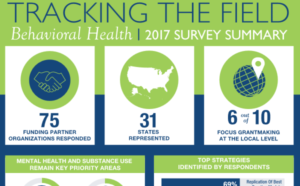Past Events
Latest Resources
Funding Upstream Solutions is Key to Remedy the Social Ills of Trauma
The root cause philanthropy cannot ignore, regardless of the outcomes we seek or the population we serve, is exposure to trauma. Trauma is defined as the effects of a single event, a series of events, and ongoing circumstances that are experienced or perceived as physically or emotionally harmful and life threatening.
Care Partners: How Philanthropy Can Kick-Start Programs to Engage Community and Family Members to Improve Depression Care for Older Adults
Late-life depression is a pressing public health concern among an aging population facing increasing chronic health concerns. As many as 5 to 10 percent of older adults seen in a primary care health setting suffer from depression, which can last for months or even years, and is associated with both decreased quality of life and higher health care costs.
Lessons from Abroad: Investing in Youth Mental Health
Now, more than ever, America stands to gain important insights from other countries that have developed comprehensive and effective approaches to youth mental health.
Behavioral Health Funding Infographic and Directory
GIH’s latest survey report highlights current trends and gaps in behavioral health philanthropy. GIH surveyed Funding Partners in March 2017 about investments in mental health, substance use, trauma, and other behavioral health issues.
Domestic Violence: A Public Health Priority
Domestic violence represents a significant public health problem that has received limited attention from the field of health philanthropy. Many health foundations fund domestic violence programs, but relatively few funders have identified domestic violence as a strategic priority.
Time to Step Up: A Call for a National Philanthropic Agenda to Combat Addiction
The country’s opiate epidemic grips national headlines. In 2016, more Americans died of an opiate overdose than from gun violence or traffic fatalities.
Facing Addiction
Philanthropy has an important role to play in addressing addiction. Substance misuse likely intersects and impacts most funders’ priorities. Recognizing these linkages offers an opportunity to think differently, forge new partnerships, and support community efforts that catalyze the cultural shift needed to reduce stigma and truly integrate behavioral health into all systems of care.
A Healthy Public Needs More Than Public Health: Lessons for Addressing Substance Use
The longstanding invisibility of substance use disorders simply cannot continue if we truly want to improve communities. We have a window of opportunity to make great strides if physical and behavioral health policymakers, advocates, and foundations work together.
Connect With Funder Peers on Behavioral Health
Interested in exchanging strategies, information, and questions with your funder peers? Sign up for GIH E-Forums.








